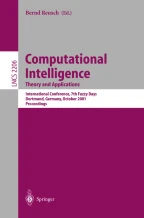Abstract
We have developed a genetic logic programming system (GeLog) which implements a combination of two different approaches for automatic programming: inductive logic programming and genetic algorithm. The paper presents the system and discusses its performance on a benchmark problem1.
This work is supported by the grants of the Bayerischer Staatsministerium für Wissenschaft, Forschung und Kunst, DAAD and Siemens
Access this chapter
Tax calculation will be finalised at checkout
Purchases are for personal use only
Preview
Unable to display preview. Download preview PDF.
Similar content being viewed by others
References
C. Blake and C. Merz. UCI Repository and machine learning Databases, University of California, Irvine, Dept. of Information and Computer Sciences, 1998. http://www.ics.uci.edu/_mlearn/MLRepository.html.
I. Bratko and M. Grobelnik. Inductive learning applied to program construction and verification. In Proc of the 3rd International Workshop on Inductive Logic Programming, pages 279–292, 1993.
C. Darwin. On the origin of species. Murray, London, 1859.
S. Džeroski. Handling noise in inductive logic programming. Master’s thesis, Faculty of Electrical Engineering and Computer Science, University of Ljubljana, Ljubljana, Slovenia, 1991.
J. Hekanaho. Dogma: A ga-based relational learner. In D. Page, editor, Proceedings of the 8th International Conference on Inductive Logic Programming, volume 1446 of Lecture Notes in Artificial Intelligence, pages 205–214. Springer-Verlag, 1998.
J. Hekanaho. An Evolutionary Approach to Concept Learning. Ph.d. thesis, Department of Computer Science Abo Akademi University, 1998.
W. Iba, J. Wogulis, and P. Langley. 73–79. In Proc. of the 5th Int. Conf. on Machine Learning, pages 1988, A. Arbor, Michigan, Trading off Simplicity and Coverage in Incremental Concept Learning. Morgan Kaufmann.
C. Jacob. Principia Evolvica — Simulierte Evolution. dpunkt Verlag, 1997.
N. Lavrac and S. Dzeroski. Inductive Logic Programming Techniques and Application. Ellis Horwood, 1995.
R. Mooney. Inductive logic programming for natural language processing. In S. Muggleton, editor, Proceedings of the 6th International Workshop on Inductive Logic Programming, volume 1314 of Lecture Notes in Artificial Intelligence, pages 3–24. Springer-Verlag, 1996.
S. Muggleton, A. Srinivasan, R. King, and M. Sternberg. Biochemical knowledge discovery using Inductive Logic Programming. In H. Motoda, editor, Proc. of the first Conference on Discovery Science, Berlin, 1998. Springer-Verlag.
S. H. Muggleton, editor. Inductive Logic Programming. Academic Press, New York, NY, 1992.
J. S. Schlimmer. Concept acquisition through representational adjustment. Technical Report 87-19, Department of Information and Computer Science, University of California, Irvine, CA, 1987.
L. R. Tang, M. E. Califf, and R. J. Mooney. An experimental comparison of genetic programming and inductive logic programming on learning recursive list functions. In 8 th Int. Workshop on Inductive Logic Programming, 1998.
A. Tveit. Genetic inductive logic programming. Diplomarbeit, Norwegian University of Science and Technology, NTNU, Dezember 1997.
P. A. Whigham and R. L. McKay. Genetic programming and inductive logic. Technical Report CS14/94, University College, University of New South Wales, Australia, 1994.
M. L. Wong and K. Leung. Genetic logic programming system: Inducing logic programs with genetic algorithms. IEEE Expert/Intelligent Systems and Their Applications, 10(5), 1995.
Author information
Authors and Affiliations
Editor information
Editors and Affiliations
Rights and permissions
Copyright information
© 2001 Springer-Verlag Berlin Heidelberg
About this paper
Cite this paper
Kókai, G. (2001). GeLog — A System Combining Genetic Algorithm with Inductive Logic Programming. In: Reusch, B. (eds) Computational Intelligence. Theory and Applications. Fuzzy Days 2001. Lecture Notes in Computer Science, vol 2206. Springer, Berlin, Heidelberg. https://doi.org/10.1007/3-540-45493-4_36
Download citation
DOI: https://doi.org/10.1007/3-540-45493-4_36
Published:
Publisher Name: Springer, Berlin, Heidelberg
Print ISBN: 978-3-540-42732-2
Online ISBN: 978-3-540-45493-9
eBook Packages: Springer Book Archive
